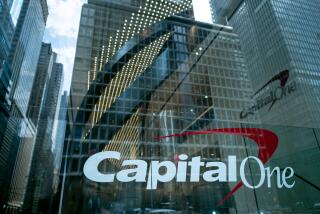PacWest to acquire CapitalSource in $2.3-billion L.A. bank merger
In a blockbuster L.A. financial merger, Pacific Western Bank plans to acquire CapitalSource Bank, creating a robust regional bank with a national commercial lending arm — but wiping out a source of high-yield savings accounts for Southern Californians.
CapitalSource had specialized in providing savings options for conservative investors, offering among the best rates in the country at a time when many institutions are paying virtually zero interest.
The banks’ parent firms, PacWest Bancorp and CapitalSource Inc., said late Monday that PacWest would pay CapitalSource shareholders about $2.3 billion in cash and stock. With $15.4 billion in loans and other assets, the merged institution would become the Southland’s fourth-largest bank, behind City National Bank, OneWest Bank and East West Bank.
The banks have markedly different business models that their executives said would combine to make a stronger and more profitable new venture. Executives said they expected no problems in getting regulators to approve the merger, set to be completed during the first quarter of 2014.
“It’s really a very cool marriage,” PacWest Chief Executive Matthew P. Wagner said Tuesday during a conference call with analysts. “Two perfect matches,” echoed James J. Pieczynski, CapitalSource’s CEO.
Pacific Western, founded in 1982, has grown rapidly in recent years by acquiring small banks, becoming what is essentially an enormous community bank. Based in Century City, it writes loans for small businesses from 75 full-service branches, mostly in Southern California. Few of its deposit accounts pay interest; most of them are transactional checking accounts for its business clients.
CapitalSource, based in downtown L.A., is an industrial loan company — a type of bank that makes loans but is barred from offering checking accounts. Originally a Chevy Chase, Md., real estate investment trust, it became a bank in 2008 by acquiring $5.6 billion in deposits from Fremont Investment & Loan, a collapsed Orange County-based subprime mortgage lender.
Its 21 branches gather funds by providing interest-bearing savings accounts, money-market accounts and certificates of deposit. On Tuesday, CapitalSource’s one-year CDs were providing an annual yield of 1.01%, compared with 0.94% at Ally Bank and 0.85% at OneWest, firms also known for offering high-yield CDs, according to rate tracker Bankrate.com.
That’s “comparable to some of the best rates anywhere in the country,” Bankrate senior analyst Greg McBride said. “The only consolation I can offer consumers is that it can be quite a while before they actually get this [merger] finished.”
CapitalSource’s 1-year CD rate is more than twice the current national average of 0.43%, said Casey Bond, managing editor of Go Banking Rates, another provider of information on deposit accounts. The only other institutions that offer rates so high are a handful of credit unions, she said.
The fact that a paltry 1% is the best available return for consumers who tie up their funds for a year shows just how hard the era of low interest rates has been on savers, she said — and no relief is at hand.
“Don’t expect to see anything exciting coming down the pipe any time soon,” Bond said.
PacWest CEO Wagner will continue in that role at the merged banks while his CapitalSource counterpart, Pieczynski, will become president of a new CapitalSource division of PacWest, continuing to oversee his current bank’s loan operations.
PacWest Chairman John Eggemeyer, an architect of the bank’s aggressive takeover strategy, will continue to hold that position; Wagner said he expected the acquisitions to continue.
The banks said combining the franchises would result in considerable savings on operating costs — an expected $47 million in 2015 alone, boosting per-share earnings about 18%. Fifteen overlapping branches, mostly CapitalSource offices, will be closed, and less-productive employees from both banks will be let go, the executives said.
As of March 31, CapitalSource had the equivalent of 530 full-time employees and PacWest 991, according to the banks’ regulatory filings. There was no estimate of how many workers might lose their jobs.
Wall Street applauded the deal Tuesday, regarding it as a way to achieve each bank’s goals, analyst Julianna Balicka of Keefe, Bruyette & Woods said.
“PacWest has wanted to grow specialty lending, and CapitalSource has publicly discussed wanting business deposits to support their lending,” she said.
PacWest’s stock finished the day up $2.29, or 7%, at $34.77. CapitalSource shares jumped $2.14, or 21.8%, to $11.97.
Both banks also reported lower second-quarter financial results Tuesday, with PacWest’s affected by $10.8 million in charges stemming from its acquisition of First California Financial Group, a Westlake Village community bank, which closed in May.
PacWest earned $4.3 million, or 11 cents a share, compared with $15.5 million, or 42 cents, a year earlier.
CapitalSource reported a profit of $29 million, or 15 cents a share, compared with $40 million, or 17 cents, in the second quarter of 2012. (The 2012 results exclude a change in tax accounting that added $1.49 per share to the quarterly net income.)
Twitter: @scottreckard







